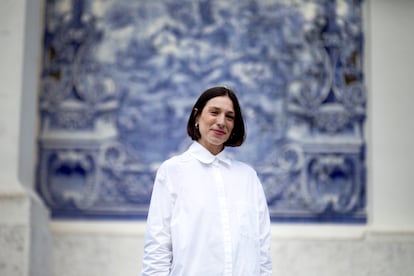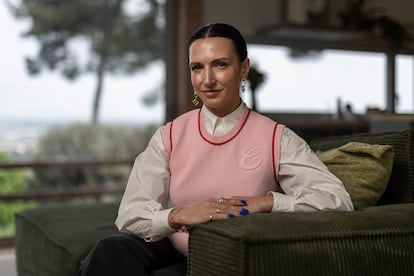‘Menopausal’ at 15?: ‘I was prescribed the pill and then told I’d never get a period’
Primary ovarian failure affects 3.7% of women worldwide and occurs due to genetic factors, but also due to autoimmune diseases or as a result of cancer treatments

María Jesús Barrena Morcillo remembers that, at 15 years old, while all her schoolmates in Calamonte — a Spanish town with barely 6,000 inhabitants — were talking about their first period, cramps, and pads, she was still waiting for her period to arrive. The closest she had ever experienced up to that point was when she noticed a rather dark brown discharge that lasted a day. “Nothing yet?” her worried mother would ask. “No,” Barrena would reply, feeling the weight of that word more deeply than she could explain.
Another image remains etched in her memory: sitting in the waiting room of a health center, with many questions racing through her mind. “You don’t have a developed reproductive system,” said the general practitioner who examined her at the time. A year later, she booked another appointment with the same doctor, but the answer was similar. “He prescribed me birth control pills, and I started having fake periods. A panty liner was enough for the whole day,” she says, recounting her story.
Barrena had always been a very active person, but she began to experience something like “a shutdown.” At 18, she started studying biology at university. While everyone around her was eager to go to parties, she just wanted to hide in a corner. She eventually stopped taking the pill and stayed away from any kind of treatment for a while. Until she decided to visit a private gynecologist in Mérida for a second opinion. Because although she tried to ignore what she was feeling, she knew something wasn’t right. Her vagina was “as dry as a raisin,” and every time she had sex, it hurt due to the lack of lubrication. She also gained 15 kilos and developed an eating disorder that she still struggles with today.
The specialist hit the nail on the head, but the diagnosis came seven years late: primary ovarian insufficiency (POI). “I found out that, hormonally, I was menopausal. I don’t have follicles, and they told me I would never get my period,” she says. “I took it in stride — I knew I wasn’t crazy,” says the now 31-year-old woman.
While the condition is often referred to as premature ovarian failure or early menopause, these are outdated and inaccurate terms. That’s something gynecologist Misericordia Guinot, coordinator of the Primary Ovarian Insufficiency Group of the Spanish Association for the Study of Menopause (AEEM), emphasizes.
“It has been called many things, but it’s referred to as primary ovarian failure because it encompasses all the conditions,” says the specialist. “The ovary doesn’t completely stop working; some follicle always remains, and there’s a 5 to 10% chance of pregnancy.”
POI occurs when the ovaries’ eggs grow, mature, and stop functioning properly before the age of 40. U.S. endocrinologist Fuller Albright was the first to describe the condition in 1942.
It doesn’t mean a woman is aging prematurely. It means her ovaries no longer function normally. For patients, menstrual periods become irregular or stop altogether — a condition known as amenorrhea. A meta-analysis reveals that it affects 3.7% of women worldwide. But another study found a prevalence of 1.1%, with variations depending on ethnicity: 1% among white women, 1.4% among Black and Latina women, 0.5% among Chinese women, and 0.1% among Japanese women.

And although the private doctor explained to Barrena what was happening in her body, there were still “so many things” she only came to understand over time. Barrena also experiences other symptoms typically associated with menopause in women around 50, such as hot flashes, night sweats in summer, and mood swings.
“I take my fan with me everywhere. I’ve completely normalized it,” she says, as if she’s made peace with an unwelcome guest that isn’t planning to leave.
This sudden sensation of heat is also part of the daily life of Marta Marcé, who was 26 years old when everything began to change.
“When you enter perimenopause so early, when you’re really in a different place, it’s hard for others to understand,” says Marcé, who is now 40, from Barcelona. But unlike Barrena, Marcé’s POI wasn’t spontaneous. It was triggered after her ovaries and uterus were removed because her doctor detected two malignant tumors.
“I went into the operating room not knowing what would happen. I entered menopause within five hours and woke up from the anesthesia with a hot flash,” she recalls.
In this case, it was a surgically induced procedure. A sudden leap into a different body, one she had to learn to live in again: she felt that what she was experiencing did not match her age.
A congenital or induced hormonal deficiency
When María Jesús Barrena was in her mother’s womb, during the embryonic stage, the follicles containing immature eggs didn’t develop. She was born with a deficiency of estrogen, a hormone essential for heart, bone, and brain health.
POI is also considered an endocrinological condition, as it involves a failure of the ovary — which is, in turn, an endocrine gland responsible for producing female hormones like progesterone. This hormone, secreted into the bloodstream, prepares the uterus for the implantation of a fertilized egg and helps maintain a healthy placenta during pregnancy. POI involves the early depletion of the ovary’s follicular reserve, according to a study by the Spanish Association for the Study of Menopause (AEEM).
María Miguélez, an endocrinologist and member of the Gonad Group of the Spanish Society of Endocrinology and Nutrition, explains that the treatment is based on hormone replacement therapy, which mimics ovarian hormone production. “Its objective is to control symptoms, improve quality of life, and maintain cardiovascular, bone, and cognitive health,” says Miguélez.
It is vital that treatment begins early — something that didn’t happen in either woman’s case. Barrena settled in Lisbon after an Erasmus study abroad program and only traveled to Spain to visit her doctor.
“From age 22 to 26 I was improperly medicated. He told me my symptoms were normal but did nothing to help treat them,” Barrena recalls. After every appointment, she would leave in tears because her gynecologist “was a hostile person.” She remembers having a panic attack once because the specialist linked a spike in prolactin to a possible tumor. In reality, it was due to an infected piercing.
When Marta Marcé received her diagnosis, she began researching due to the lack of available information — which was even more pronounced 14 years ago. “I didn’t want to settle for that quality of life, because this isn’t just about no longer menstruating. Something inside me told me that what I ate, how I exercised — that it all mattered. And I was right,” she says.
Marcé now works as a nutritionist specializing in menopause, inspired by her own experience. “You feel different, and people assume this can’t happen to you at a younger age,” Marcé says.
Barrena now receives estrogen through a patch, which has improved her quality of life. She also takes dietary supplements like omega-3 and omega-7, which help the brain. “In the future, if you give me any small details about the conversation we’re having, I won’t remember them,” Barrena admits, as she struggles with short-term memory.
Generally speaking, nutritional recommendations for women with POI are similar to those for natural menopause, notes nutritionist and dietitian Júlia Farré. The main reason is that, although the chronological age may be different, the physiological consequences of decreased estrogen are comparable.

“Vitamin D is essential for preventing accelerated bone loss and contributes to the proper functioning of the immune system,” says Farré. “In some cases, vitamin K2 can be useful for improving bone mineralization in combination with vitamin D.”
However, there are nuances. Since these women are still young, “their energy needs, active lifestyle, and reproductive health should be considered if they are undergoing hormone replacement therapy or wish to preserve fertility.”
An overlooked issue
For some women, this transition to another life stage comes much earlier — when life, perhaps, should be unfolding in a different way. Lara Roca’s story began with a lump in her breast. The cancer diagnosis came just four days before she was due to start a new professional project in Argentina in 2023.
Speaking via video call from Manresa, a city nestled among mountain ranges in the heart of the Spanish region of Catalonia, Roca recalls undergoing six months of chemotherapy. “It was a tough treatment, but I handled it well,” she says. Afterward, she began hormone therapy because around 85% of her tumor was estrogen-sensitive. “With these pills, what you do is neutralize the hormones in your body,” she explains.
With the drop in estrogen levels, Roca became more prone to infections. Her sex life was also affected. “We don’t talk about it much because we’re a young couple, but your libido drops significantly,” she says. Chemotherapy also destroyed her entire ovarian reserve.
“Motherhood is the last thing on your mind, but it’s true that I had an ovarian extraction to freeze my eggs,” she says. Her body, meanwhile, began showing symptoms like hot flashes — just like Barrena and Marcé — as well as joint pain and dryness in the mouth, vagina, and anus. Probiotics and gels have helped relieve some of these symptoms.
“I’m super active and I won’t stop. I don’t stop because I have a great zest for life, having spent so much time without being able to do many of the things I enjoyed,” she says with conviction.
María Jesús Barrena laments having gone years without knowing what was really happening to her. “No one had a lightbulb moment. Science has left women behind because we are [hormonally] cyclical,” she says.
Sign up for our weekly newsletter to get more English-language news coverage from EL PAÍS USA Edition
Tu suscripción se está usando en otro dispositivo
¿Quieres añadir otro usuario a tu suscripción?
Si continúas leyendo en este dispositivo, no se podrá leer en el otro.
FlechaTu suscripción se está usando en otro dispositivo y solo puedes acceder a EL PAÍS desde un dispositivo a la vez.
Si quieres compartir tu cuenta, cambia tu suscripción a la modalidad Premium, así podrás añadir otro usuario. Cada uno accederá con su propia cuenta de email, lo que os permitirá personalizar vuestra experiencia en EL PAÍS.
¿Tienes una suscripción de empresa? Accede aquí para contratar más cuentas.
En el caso de no saber quién está usando tu cuenta, te recomendamos cambiar tu contraseña aquí.
Si decides continuar compartiendo tu cuenta, este mensaje se mostrará en tu dispositivo y en el de la otra persona que está usando tu cuenta de forma indefinida, afectando a tu experiencia de lectura. Puedes consultar aquí los términos y condiciones de la suscripción digital.









































